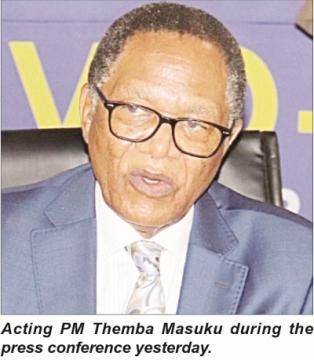STRICT PARTIAL LOCKDOWN FOR ESWATINI

MBABANE – Eswatini is once again under strict partial lockdown following the announcement of several restrictions yesterday.
For the next two weeks, all gatherings of any sort in the country have been banned, regardless of the size.
The only gathering allowed will be of funerals, even then only a maximum number of 50 people will be allowed to attend.
The new changes were announced by the Acting Prime Minister, Themba Masuku, who reported that government, through the sustained counsel of Their Majesties, had taken the decision to strengthen the partial lockdown restrictions to disrupt the spread of the coronavirus.
The revised regulations are with effect from midnight today (Friday, January 8, 2020).
Although burial gatherings are permitted, the acting PM put it clear that memorial services were strictly prohibited while the funerals were limited to two hours.
Masuku further stated that those who had passed on should be buried as soon as possible, preferably within three days.
Changes
The acting premier, when interviewed after announcing the new changes, made it clear that even church gatherings were not allowed and advised all to hold virtual services.
He said though he was a Christian, the pandemic was serious and in jest said it was also difficult to sing while wearing a mask.
Masuku said physical meetings, when absolutely necessary, would only be for first line responders such as health workers or security officers directly involved in the fight against COVID-19.
He said these physical meetings would only be limited to 20 people (first line responders) beyond which only virtual meetings would be allowed. Masuku said although the new restrictions would more likely be reviewed within 14 days, it did not mean that government could not make changes earlier if the situation changed.
Monitor
“We will monitor the situation if stronger measures need to be taken, we will do just that, but if we can relax same, we will also follow suit,” said Masuku.
Other changes which are expected to take place include the reduction of the number of passengers who can be carried in public transport vehicles as Masuku stated that these would not be allowed to carry passengers at full capacity.
Instead, Masuku announced that all vehicles would be allowed to only carry 80 per cent their capacity and this also applied to those that were privately-owned.
The retail sector has not been spared as government announced that all shops should be closed by at least 6pm while liquor traders will only be allowed to operate from Monday to Thursday at shorter trading hours; being 11am until 4pm.
Just when emaSwati were dusting their passports to start travelling again, government has also put a stop to unnecessary trips to neighbouring countries save for people seeking medical attention, schooling, work and business purposes.
Masuku made it clear that border officials would carefully scrutinise all documentation to ascertain that the new directives were adhered to.
Meanwhile, the acting premier said since the beginning of December 2020, Eswatini had experienced a huge surge in the number of confirmed COVID-19 cases and related deaths.
“We have recorded 139 deaths over the period and 4 120 new infections,” said Masuku.
He said as the second wave persisted to peak, more people were presenting with symptoms categorised by rapid deterioration in clinical condition.
“Evidently, we are at the belly of the beast and decisive action needs to be taken to save lives and to ease the pressure on our health system,” said Masuku.
He stated that everyone needed to clearly understand that the COVID-19 pandemic was aggressively challenging the nation’s survivability.
He reminded emaSwati and all residents that the core mandate of the government under the Tinkhundla System of Governance included, though not limited, to inclusive nation building, promoting and protecting the health of nationals and the promotion and protection of the economy.
He said the new restrictions were in compliance with Regulation 51 of the COVID-19 Regulations 2020, which allowed the amendment of regulations after consultations with ministers responsible for a particular sector.




 del.icio.us
del.icio.us Digg
Digg
Comments (0 posted):